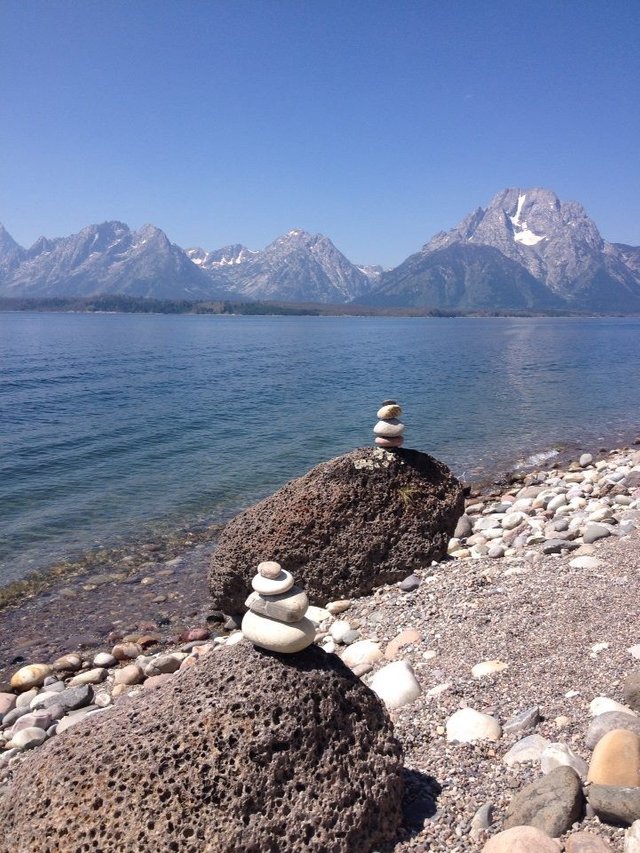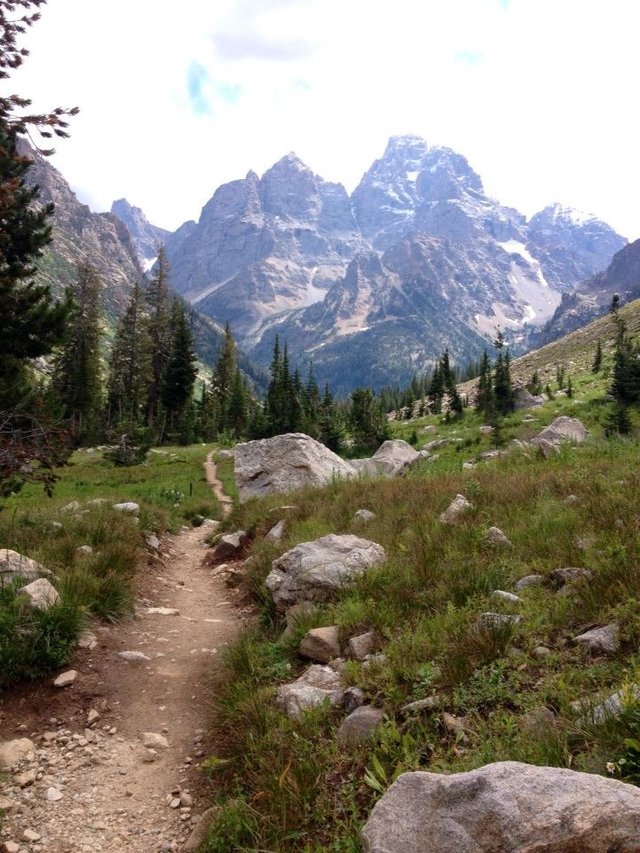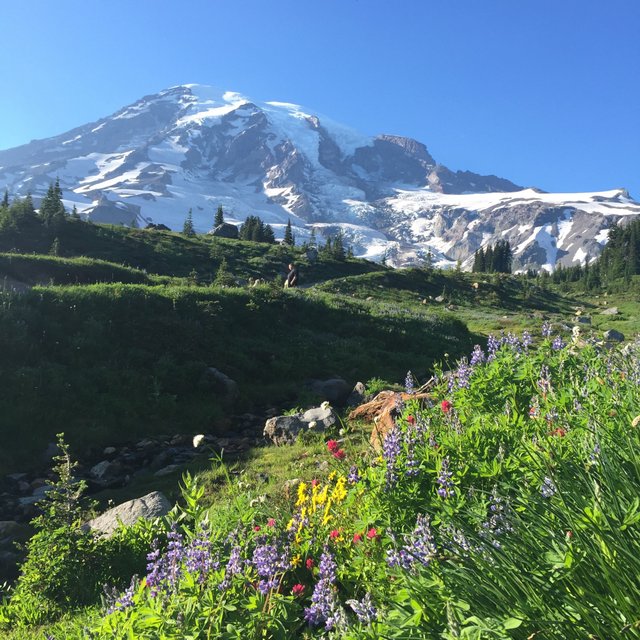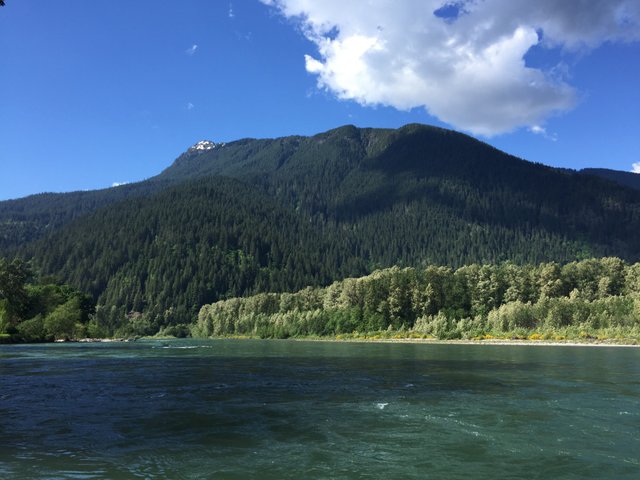The Strange World of National Park Gift Stores
The price I paid for a temporary refuge, immense beauty, and some unforgettable experiences
our years ago, I quit my good-paying, respectable job as an acquisitions editor in Kansas and started working at a gift store in Grand Teton National Park. The job was only temporary — a summer gig before I started graduate school in California — but it would, ultimately, change the direction of my life.
I wanted to go somewhere beautiful because I was sad. That spring, I’d gone through a breakup and was suddenly overwhelmed by sadness for all I was about to leave behind when I moved: my friends, my home, my memories. I decided I needed to go somewhere else — somewhere new and completely unfamiliar — lest I spend my summer in premature mourning for Kansas. I started researching and soon stumbled upon a website that advertised jobs in beautiful places all over the country: national parks, organic farms, horse ranches. One posting was for a job at a gift store in the Tetons. Without thinking twice, I dashed off an application. When I received a phone call saying they wanted me to start in August, two months before my first day of grad school, I did not hesitate to say yes.
I’d never been to the Tetons before. Once, while driving to Yellowstone with my friends, I spotted the Teton Range poking up from the horizon, a row of silver teeth. Even then, I felt drawn to them. Little did I know that in a couple years I’d be sleeping in a dorm room on the shore of Jackson Lake, Mount Moran and her sisters of the Teton Range standing guard over the lodge and all of us confused twenty-somethings who worked there.

When I got to the lodge, I was visibly shaking. What if I didn’t make friends? What if I was bad at my job? What if everyone thought I wasn’t outdoorsy enough? I saw a few of the employees in the parking lot; they looked like models from a Patagonia catalog: suntanned, muscled, beautiful. In Kansas, I was part of the rock climbing club, but I still felt like a novice. I’d never seen a bear in the wild and had only been backpacking once, during a trip to Yosemite, and I cried when a rattlesnake popped out in front of me on the trail. I was girl from Kansas and figured everyone would be able to smell it on me.
Because I was a midseason hire, I began work my first morning in the park. A girl named Anna taught me how to operate the register and introduced me to the gift store’s merchandise: coffee mugs, retro posters, and an endless variety of T-shirts and hats. It seemed crazy that people might want to buy some of the things we sold: glass hummingbirds so delicate that more were broken than not, wood carvings so large they would require their own suitcase (and came from China — it said so on the bottom), and $20 cedar boxes that were meant to contain a wish. There were some arguably cool things — turquoise jewelry, glossy postcards of wolves, huckleberry caramels so tasty that the gift shop girls would take turns buying a handful and sharing — but mostly it was junk, the kind of knickknacks destined for Goodwill.
Aside from the women I worked with — two girls around my age and a crew of white-haired retirees from the South — I was too shy to make friends right away and found myself spending most of my time alone. I ate lunch on the picnic tables by the lake and spent my afternoons on the beach, reading, journaling, or just staring off at Mount Moran. After the immediate wave of loneliness receded, I learned to accept this solitude and let it ebb and flow on its own accord. I let it carve away at my homesickness and fill me instead with gratitude — for the place I was in, for the opportunity I had to be there. The park taught me that it was okay to be somewhere new, to feel alone and scared, so long as I was paying attention, so long as I was open to learning from it. I didn’t know it at the time, but it was a lesson I would return to again and again in the years to come.
On my days off, I went hiking. I had never hiked alone, and the nervousness of being out by myself quickly turned into a bliss I’d never experienced. Alone, on a trail, surrounded by trees and mountains and sky, I felt for the first time that I was truly on my own, a free agent in the world. My life was mine, and I could do with it what I pleased.

Of course, just as I started to feel settled within myself, I met a guy — a musician from Arkansas — and fell into the type of quick, making-a-movie-together puppy love that is, I would come to find out, fairly common in seasonal work. Once you’re open to it, falling in love in a national park is as easy as finding a seashell on a beach. All you have to do is look around.
When I left the Tetons, I did so just as heartbroken as when I left Kansas. I’d grown to love the mountains and had become attached to the singer from Arkansas. Working at the gift store was tedious and exhausting, but it gave me access to a host of things I would miss: quiet afternoons journaling by the water, the squeak of a whistle pig as I walked to the dining hall, sitting on the dock and watching the sky grow heavy with stars.
My time in the Tetons had been a life-changing experience, one I figured I’d never have again. I assumed that after grad school I would start my life as an adult. I would find a teaching job and teach creative writing. I would look back on my time at the gift shop as if it had been a brief dream between two waking days — a fun escape into the clouds, but nothing more.
Part Two: Mount Rainier
Two years later, I found myself once again heartsick, unsure of what to do. The guy I’d been dating in California had just dumped me via email, and I was about to leave another group of friends — the cohort of writers I’d grown to love. I had a master’s degree, a collection of short stories, and a plan to start house-sitting for one of my professors in the fall, but my summer was a question mark. Because I had nothing else to do, I did the only thing I could think of: I applied for a job at a gift store in Mount Rainier National Park.
The gift store was in the Paradise Inn, a historic hotel situated at 5,400 feet on Rainier’s southern slope. The road to Paradise is steep and winding, a literal journey into the clouds. Stuffed window to window with everything I owned, my 1995 Camry shook as I turned up each switchback. I arrived to Paradise breathless, tired, electrified by having left California behind.

After I checked in with HR, a 19-year-old from Florida showed me to my room. She smelled like incense and wore silky parachute pants. “Are you here alone?” she asked. “Or did you come with a friend?”
“I’m alone,” I said. “What about you?”
“I came here with my best friend, but she crashed the company van, so she had to go home.”
“That’s too bad,” I said.
“It’s okay. I have a boyfriend now — he’s handsome. You’ll see when you meet him.” She smiled at me — the smile of a girl who has stumbled into her own fairy tale.
She led me to the girl’s dormitory, called the Guide House; the main floor was an active ranger station. My room was two stories up, in a shoebox-sized space I was to share with three other girls and several dozen mice. The air smelled of bodies and old clothes, stale food and fruity perfume. But outside the window stood Mount Rainier — known to the native Salish as Tahoma — so close you could almost touch her. The grass at her feet was bright green, dotted with Indian paintbrush and lupine, buttercups and mountain aster.
I started work the next morning and soon discovered that the gift store was twice as busy as the one in the Tetons. All day, customers crowded the store, elbowing one another for glittery ornaments, T-shirts, and bottle-opener keychains. The merchandise was cheap; the heads of the grizzly bear magnets would pop off, and we’d attach the severed, grinning heads to our registers, facing away from the customers. Everyone I worked with had their own reason for being on the mountain — to save money, to be near nature, to get healthy — but we all shared two things: our love for the mountain and our hate for the gift store.
To survive the chaos of the store, I did what I’d learned in the Tetons and created a space for reading and writing. Each morning, I’d fill my thermos with coffee and head to the inn’s balcony. The balcony overlooked the Tatoosh Range, a sequence of peaks more beautiful, in my opinion, than Mount Rainier herself. Here, I would sit among the tourists and write in my journal, recording both the lows and the highs: the days when customers yelled at me for giving them incorrect change; the days when I got off work early and went hiking or read a novel in the inn’s mezzanine. Once, while sitting on the balcony in the evening, I watched a bird’s nest fall into a woman’s glass of wine. “Do I get a free refill?” she asked her server.
Working at the register did not make me feel good about myself. I was 25, had a master’s degree, and was earning $9 an hour selling snow globes to tourists. In California, all my friends were writers, and for two years our job had been to learn, teach, and practice the art of fiction. On the mountain, I felt alone, as if I spoke a different dialect than everyone around me.
Some days were harder than others. At the store, we had to check photo ID for anyone using a credit card. Sometimes, if I saw that a customer was from California, I would mention that I went to school in Davis.
“That’s a terrific school,” one man once said. “What did you study there?”
“I got my master’s in English.”
“You have a master’s degree? And you’re working here? At a cash register?” he shook his head, as if I were his daughter and had brought shame upon my family. “What a waste.”
Looking back, there are many things I wish I would have said to this man. I could have told him that I liked working in national parks, or that finding a good job was still difficult, even with a master’s degree; that things weren’t as simple as they were when he was my age. I could have told him that what I did or did not do with my life was none of his business. But instead I continued to ring up his merchandise. “Have a nice day,” I told him, even though I was certain he would not. If I learned one thing from my time in gift stores, it is that certain people will be unhappy no matter where they are. They can be in a place of unparalleled natural magnificence, a 14,000-foot mountain looming above them, and all they will see are the smelly bathrooms, the overpriced food, the crowds.
One morning, at the peak of my sadness, I woke in my dorm room and checked my email, holding my phone to the window for a better signal. I did this only a couple times a day, since the Wi-Fi was spotty and it took a few minutes for a page to load. My roommates were snoring in their bunks when I read a message that began “Congratulations!” According to the email, I had won the Flannery O’Connor Award. I would have my book of short stories — the thesis I had defended a couple months before — published. I read the email seven more times before leaving the room, worried my heartbeat might wake my roommates.
At work that morning, I told my supervisor what happened. “I won an award,” I said. “I’m going to have a book.”
She looked at me and smiled, clearly unsure of what to say. “Wow, that’s neat,” she said. And then, after an awkward moment, added, “Could you go fold the new shipment of T-shirts?”
Because there was no cell service on the mountain (another source of rage for the tourists), I called my mother on the inn’s pay phone and told her the news. Otherwise, I kept it mostly to myself, learning that the pleasure of my accomplishment was sweetest when it stayed close.
When I left Rainier, I did so thinking that, once again, it would be my last stint with national park gift stores. I was headed to Colorado, to caretake my professor’s ranch and work on my novel. After this, I’d be able to start my career. I would have a published collection of stories and a novel in the works. Surely, I could get a teaching job. Surely, I would be able to build a life around writing.
Part Three: The North Cascades
After spending eight months in Colorado on my professor’s ranch, I found myself once again uncertain what to do with my life. I’d applied to dozens of teaching jobs, but despite the book award, I couldn’t even land an interview for an adjunct position. Unsure of what else to do, I returned to the website where I’d found my other park jobs. This time, I came across a job in North Cascades National Park, a beautiful but lesser-known park a few hours north of Mount Rainier. I remembered my supervisor in Rainier telling me about it one day, after she’d spent a weekend there. “It’s the most beautiful place I’ve ever seen,” she said — quite the statement for someone who worked in a place called Paradise. In the North Cascades, I’d once again be working at a cash register, but I would receive health insurance and earn slightly more than minimum wage. It wasn’t a teaching job, but it was something.
I left the ranch with a heavy heart — I’d grown attached to the animals, to the solitude and the long quiet days of writing. I was worried about living in a house with four other people and no animals. I was worried about working full-time and having little time for writing. I was worried about my life taking off in a direction that wasn’t right.
Like I’d feared, the job was completely wrong for me, as it had been in the Tetons and in Rainier. The gift store was in the visitor’s center, and I was technically the only employee. If I needed a break, the rangers would take over the register, but they were busy enough as it was. Although it used to be a relatively quiet park, the North Cascades had recently been “discovered,” meaning droves of people now entered the park, excited by the pictures they’d seen on Instagram of turquoise waters and snowcapped peaks.
The mountains in the North Cascades are steep, with a greater vertical relief than any other mountains in the lower 48. As a result, most tourists choose to drive through the park rather than brave the elevation gain required by the hikes. Many of these tourists end up in the visitor’s center, where they hunt for the perfect magnet or postcard to commemorate their journey. They want something to prove they’ve been there: a stamp for their national park passport, a pin for their pin collection, a sticker for their water bottle. They want something they can hold onto, to prove they went somewhere wild.
Another thing the tourists want is to tell you about their trip. They want you to know about the animal they saw crossing the road — it was a wolverine, they say, before supplying a perfect description of a raccoon. They want you to know that this is their 14th national park or that their father was a park ranger long ago. They want you to know they just got divorced, or married, or are traveling the country on their bicycle. They want to share their experience, to have someone witness their newfound freedom, and the hard truth is that some days, as a face behind a cash register, you simply don’t have the energy or patience to care.
As a writer, I found this especially difficult. I make it my life’s passion to examine the experiences of others, to consider the emotional landscape of strangers and attempt to understand their story. But after standing behind a register for eight hours a day, five days a week, repeating the same small talk and answering the same handful of question — Are the trees dead from beetle kill? (No, there was a fire in 2015.) Is there anywhere to camp? (No, the campgrounds are full.) Where can I see bears? (We’d rather you not go looking for bears.) — it’s hard to remain interested in the human experience. Compassion is a limited resource, and in retail it runs out fast.

And yet, outside the store, life was a dream. I lived on organic farmland half an hour from the visitor’s center, in a house I shared with three park rangers and a guy who worked trails — a guy I would soon find myself falling in love with. In the evenings, after a chaotic day of work, I would sit by the Skagit River and watch the mint-colored water make its way down valley, where it would eventually empty into Puget Sound. Sometimes I would lay out a blanket and read a book or write in my journal, the song of a Swainson’s thrush twirling in the distance. Like this, I fell in love with the world, with the mountains and the people and the smell of evergreen trees and river water.
In the end, working in the gift store — a job I felt was beneath me, that did not utilize my skills, that made me borderline miserable and numbed me emotionally — was the price I had to pay for this beauty, for the temporary refuge of the park and the incredible people I met there. It was the gift store job, mindless and tedious as it was, that had brought me to this place of beauty, as well as the ones before it.
I can’t say that selling souvenirs to tourists is the most poetic way to experience life in a national park, but I do know I wouldn’t trade these experiences for anything else: not a high-paying job, or a pretty apartment in a city, or a life without all the hiccups and bumps that led me to the parks in the first place. In the end, I owe a lot to national park gift stores and the people who flock to them — the people who want something to remind them of a time they were happy, a time when they felt free
You're happy, you're free... so wtf? And yours photos are amazing and beautiful... Nothing more really matter, yeap...
I'll follow you... Would you follow me? ♥
Congratulations @rahulg618! You received a personal award!
You can view your badges on your Steem Board and compare to others on the Steem Ranking
Do not miss the last post from @steemitboard:
Vote for @Steemitboard as a witness to get one more award and increased upvotes!